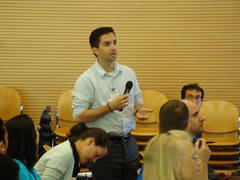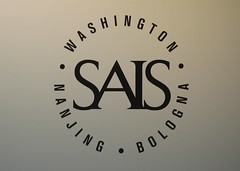 I’ll briefly address participant feedback from my recent presentation and this afternoon’s discussion on the International Criminal Court (ICC).
I’ll briefly address participant feedback from my recent presentation and this afternoon’s discussion on the International Criminal Court (ICC).
Yesterday afternoon I shared my experiences and views from my 2008-2009 deployment to Iraq as an embedded military advisor. Mostly through pictures, I illustrated my interpretation of the delicate nuances of positive organizational change i.e. advising the Iraqi military. The informal atmosphere and candid exchange from fellow participants helped everyone better understand the difficulties and pitfalls associated with external actors attempting change within the context of conflict.
During the afternoon session Rod Rastan, Legal Advisor, Office of the Prosecutor at the ICC, discussed the structure, procedures and controversy surrounding the ICC. Three points resonant following his presentation: the concern over ICC independent prosecutor latitude, the far-reaching effects of ICC indictments and using ICC indictments as a negotiating tool.
 First, of the three scenarios’ in which the ICC can accept cases (requests by states, discretion of the independent prosecutor, and the United Nations Security Council) several actors were concerned over the latitude given to the independent prosecutor. Two structural components of the ICC, judicial oversight and limited resources, encourage the independent prosecutor to select cases in the best interest of serving justice. Second, the ICC acknowledges the far-reaching effects of its indictments and seeks to mitigate some of the possible negative side-effects. Mitigation efforts include briefing the Security Council semiannually and creating predictable procedures thus creating reliable international norms. Finally, since ICC indictments can be suspended (by the Security Council) a debate over using suspensions as a negotiating tool rages on. Some argue indictment suspension could encourage more productive peace processes. Alternatively while the ICC values productive peace processes, they contend suspending indictments is a form of judicial blackmail which creates negatives consequences for the legitimacy and weight of future indictments. In sum the ICC is filling a judicial void by encouraging domestic judicial systems to prosecute terrible crimes and by attempting to administer justice in where injustice reins supreme.
First, of the three scenarios’ in which the ICC can accept cases (requests by states, discretion of the independent prosecutor, and the United Nations Security Council) several actors were concerned over the latitude given to the independent prosecutor. Two structural components of the ICC, judicial oversight and limited resources, encourage the independent prosecutor to select cases in the best interest of serving justice. Second, the ICC acknowledges the far-reaching effects of its indictments and seeks to mitigate some of the possible negative side-effects. Mitigation efforts include briefing the Security Council semiannually and creating predictable procedures thus creating reliable international norms. Finally, since ICC indictments can be suspended (by the Security Council) a debate over using suspensions as a negotiating tool rages on. Some argue indictment suspension could encourage more productive peace processes. Alternatively while the ICC values productive peace processes, they contend suspending indictments is a form of judicial blackmail which creates negatives consequences for the legitimacy and weight of future indictments. In sum the ICC is filling a judicial void by encouraging domestic judicial systems to prosecute terrible crimes and by attempting to administer justice in where injustice reins supreme.
Anthony Cerella, USA

